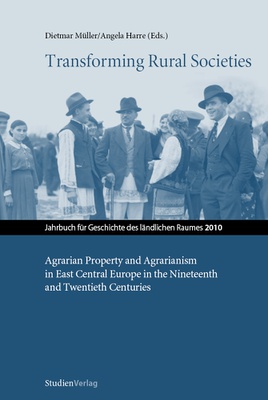Agrarian Property and Agrarianism in East Central Europe in the Nineteenth and Twentieth Centuries (JGLR 7/2010)
Edited by Dietmar Müller and Angela Harre
Private property to land as well as the institutions for administering it, like cadastres and land registers, have undergone a spectacular ideological rehabilitation in the post-Communist transformation societies of East Central Europe. We witness another phase of ideological and institutional reconfiguration of property and development schemes for agriculture. This volume concentrates on the interrelations between changing property regimes and so called 'agrarianist' development strategies in the nineteenth and twentieth centuries. There had been property changes in an enormous dimension especially in the interwar period. The expropriation of the former feudal classes starting in 1918 was combined with a massive nationalist mobilization of the rural masses, thus threatening the property of ethnic minorities, too, and causing the rise of Fascism and national chauvinism. In connection with missing improvements in rural production and the break-up of traditional social bonds, the peasants’ standard of living deteriorated and they often turned against modernization as such. After World War II these reforms considerably influenced the degree of collectivization in communist times as well as the redistribution of formerly expropriated land during the social and intellectual transformation process in the 1990s. These processes are traced in the post-World War I land reforms, the professionalisation of rural elites and the institutionalisation of land accounting systems, in peasant parties and the agrarian press, and in the programs of peasant and Fascist economists and politicians.
Introduction/Einleitung
Dietmar Müller/Angela Harre: Agrarianism as Third Way. Between Fascism and Communism and between Capitalism and Collectivism / Agrarismus als Dritter Weg. Zwischen Faschismus und Kommunismus sowie zwischen Kapitalismus und Kollektivismus
Articles
Dietmar Müller/Alina Bojincă: Die juristische und geodätische Administration des Eigentums an Grund und Boden in Rumänien im 20. Jahrhundert
Srđan Milošević: The Agrarian Reform – A ‘Divine Thing’. Ideological aspects of the interwar agrarian reform in the Kingdom of Serbs, Croats, and Slovenes/Yugoslavia
Cornel Micu: Collectivization and Social Change in Communist Romania
Stefan Dyroff: Die Wahrnehmung der ostmitteleuropäischen Landreformen in Westeuropa 1918–1939
Katja Bruisch: Historicizing Chaianov. Intellectual and scientific roots of the Theory of Peasant Economy
Jovica Luković: Sozialismus als bäuerliche Zukunft. Ideologische Grundlagen des linken Agrarismus in Jugoslawien in der Zwischenkriegszeit
Johan Eellend: The Harvest of Modernization. The formation of Agrarianism in Estonia prior to World War I
Fredrik Eriksson/Johan Eellend/Piotr Wawrzeniuk: The Mirror of Agrarian Modernity. Agrarian press in Estonia, Galicia and Sweden, 1890–1917
Daniel Brett: Taking the Long View? Polish and Romanian Agrarianism in comparison
Traian Sandu: A Model of Fascism in European Agrarian Peripheries: the Romanian case
Bestellungen und Anforderung von Rezensionsexemplaren beim StudienVerlag (ISBN: 978-3-7065-4950-9)
